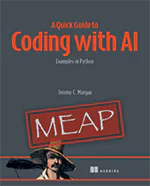What is Python and Why Learn It?
Read this if you’re considering learning Python here.
Author: Jeremy Morgan
Published: July 21, 2024
I wrote a book! Check out A Quick Guide to Coding with AI.
Become a super programmer!
Learn how to use Generative AI coding tools as a force multiplier for your career.
Hey there, coders! Today, we’re talking about Python—one of the most popular programming languages today. If you’ve been dabbling in the world of programming or heard tech-savvy friends rave about it, you might be wondering: What is Python? And why should I learn it? Let’s explore!
What is Python?
At its core, Python is a high-level, versatile programming language. Created by Guido van Rossum and first released in 1991, Python was designed with readability and simplicity in mind. It’s used for a wide variety of applications, from web development and automation to data science, AI, and even game development.
So what makes Python such a big deal? Its biggest strength is its ability to handle both small scripting tasks and complex, large-scale projects—all with relatively simple code.
Why Learn Python?
Great question! Python is known for being beginner-friendly, but that’s just one of its many perks. Here’s why you should consider adding Python to your coding toolkit:
1. Easy to Learn and Use
Python has a reputation for being one of the easiest programming languages to learn. Its syntax is clear and intuitive, resembling everyday English. This means fewer lines of code to achieve the same results you’d get in other languages like C++ or Java. If you’re new to programming, Python is the perfect starting point.
Example: Here’s how you would print “Hello, World!” in Python:
print("Hello, World!")
Pretty simple, right?
2. Versatility
Python isn’t just for one thing—it’s incredibly versatile. You can use it for web development (with frameworks like Django or Flask), data analysis (using libraries like Pandas or NumPy), automation (scripts to automate repetitive tasks), AI, machine learning, and even game development.
Imagine you’re interested in building a website—Python’s got you covered. Want to analyze a massive dataset? Yup, Python can handle that too. Pretty awesome, right?
3. Large and Supportive Community
Python has been around for over three decades, which means it has a massive community of developers. If you ever get stuck on a project or have questions, chances are someone else has faced the same issue and found a solution. Sites like Stack Overflow, GitHub, and Reddit are full of Python enthusiasts ready to help out.
4. Extensive Libraries and Frameworks
Python’s rich ecosystem includes libraries and frameworks that make coding faster and easier. Want to create a data visualization? Use Matplotlib or Seaborn. Need to scrape data from the web? Python’s BeautifulSoup and Selenium libraries are perfect for that.
You don’t have to reinvent the wheel; chances are, there’s already a library that can help you accomplish your task.
5. In-Demand Skill
Python skills are highly sought-after by employers. From startups to tech giants like Google, Facebook, and Amazon, companies are on the lookout for developers proficient in Python. It’s consistently ranked as one of the top programming languages in job postings. So, learning Python can boost your employability and open doors to exciting career opportunities.
6. Cross-Platform Compatibility
Python works across different platforms—Windows, macOS, Linux, you name it. This makes it super convenient if you work on multiple systems or plan to deploy your code on various platforms. You write your code once, and it runs almost anywhere!
7. Great for Automation
Tired of repetitive tasks? Python can help you automate them! Whether it’s renaming files, sending emails, or scraping websites, Python’s automation capabilities can save you tons of time.
Here’s a small taste of Python automation. Let’s say you want to rename all .txt files in a folder:
import os
for filename in os.listdir('.'):
if filename.endswith('.txt'):
new_name = 'renamed_' + filename
os.rename(filename, new_name)
Run this, and you’ve just renamed all your .txt files. No more manual renaming!
8. Perfect for Data Science and AI
If you’re into data science, machine learning, or artificial intelligence, Python is your go-to language. Libraries like TensorFlow, Keras, and Scikit-learn make building machine learning models much easier. Python’s straightforward syntax means you can focus on analyzing and interpreting data instead of wrestling with code.
Benefits of Learning Python
Let’s recap the benefits:
- Readable and easy syntax: Great for beginners.
- Huge library ecosystem: Tons of libraries for everything from web development to data science.
- Wide variety of applications: From websites to AI, Python can do it all.
- Supportive community: Plenty of resources and help available online.
- Cross-platform compatibility: Works on any operating system.
- In-demand skill: Employers love Python developers.
Conclusion
So, why learn Python? Whether you’re just starting your programming journey or looking to expand your skills, Python is a fantastic choice. It’s easy to pick up, extremely versatile, and opens the door to countless opportunities in tech.
Now’s the perfect time to start! Dive into some Python tutorials, start building projects, and explore everything this amazing language has to offer.
Happy coding!
I wrote a book! Check out A Quick Guide to Coding with AI.
Become a super programmer!
Learn how to use Generative AI coding tools as a force multiplier for your career.

